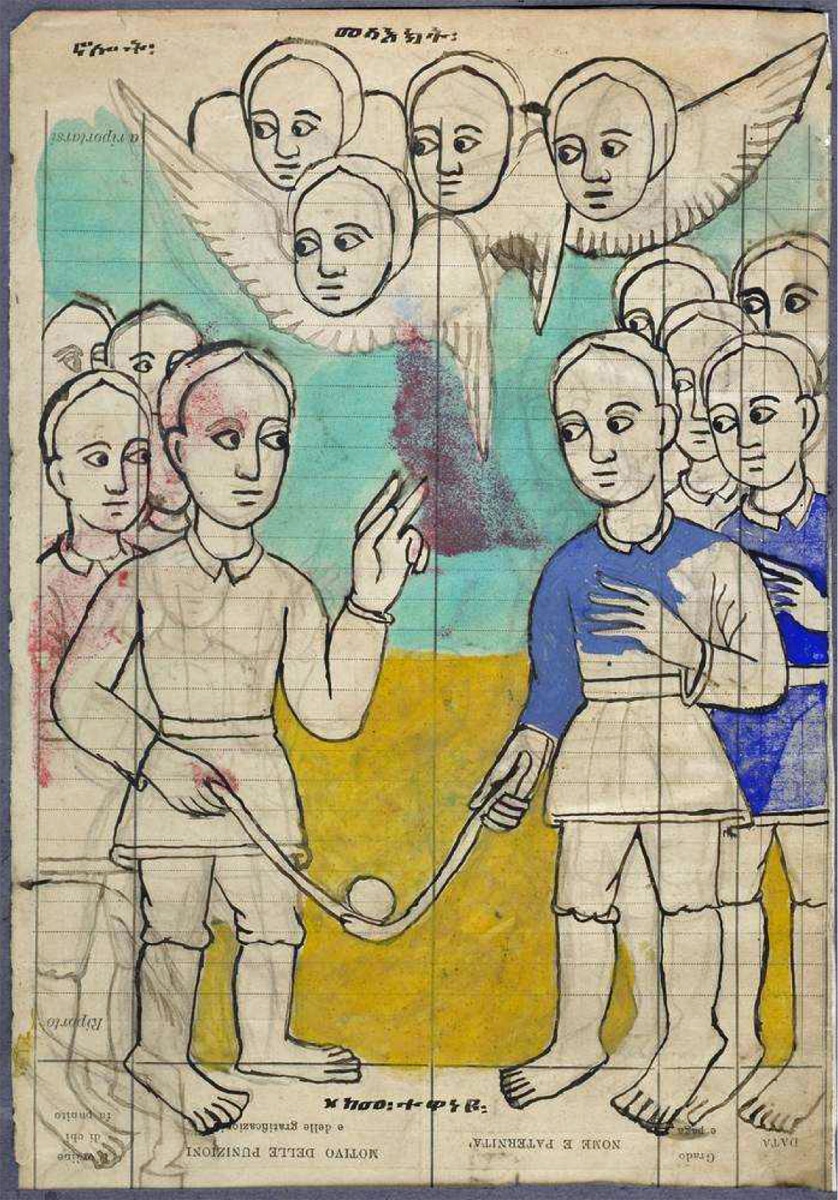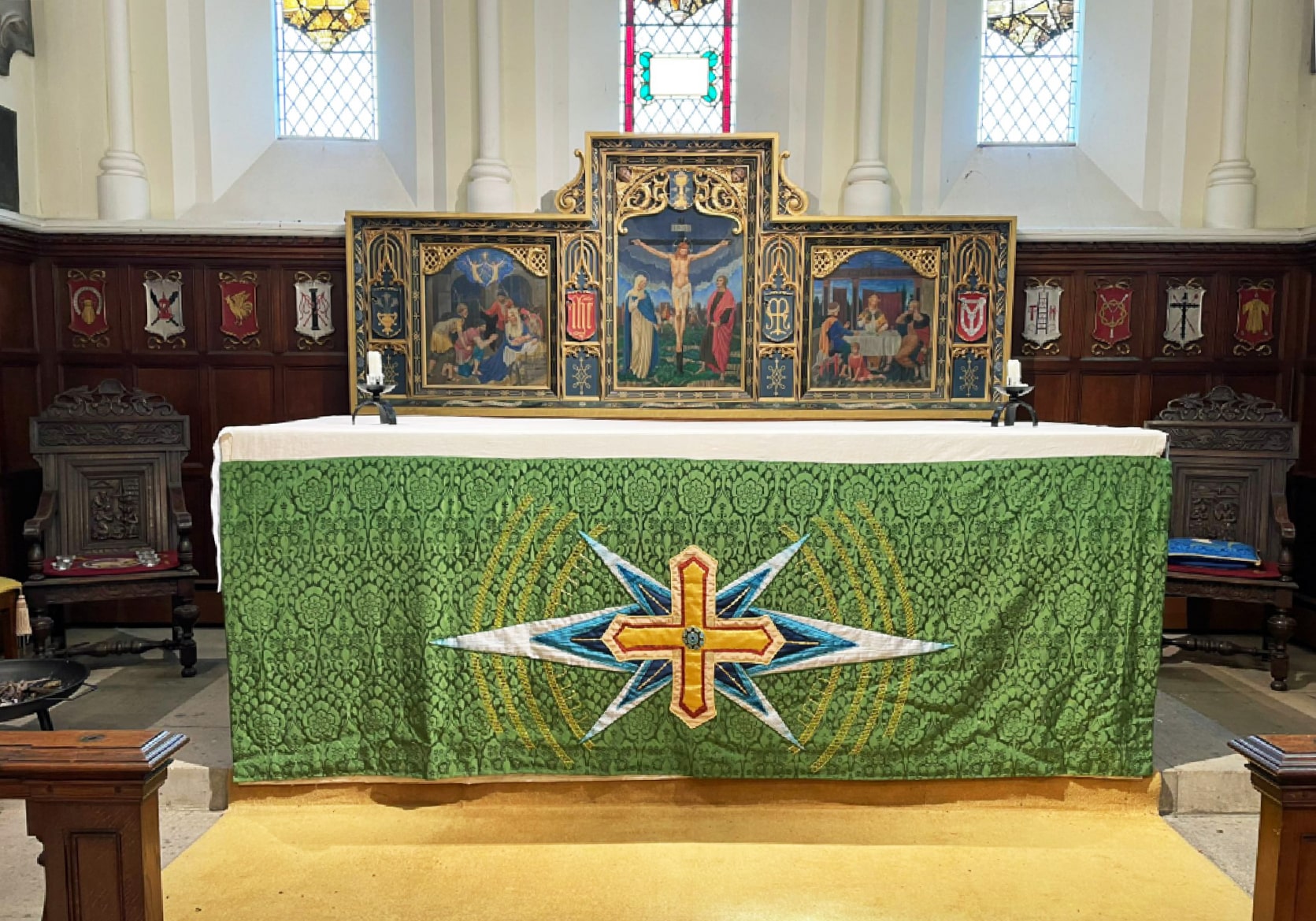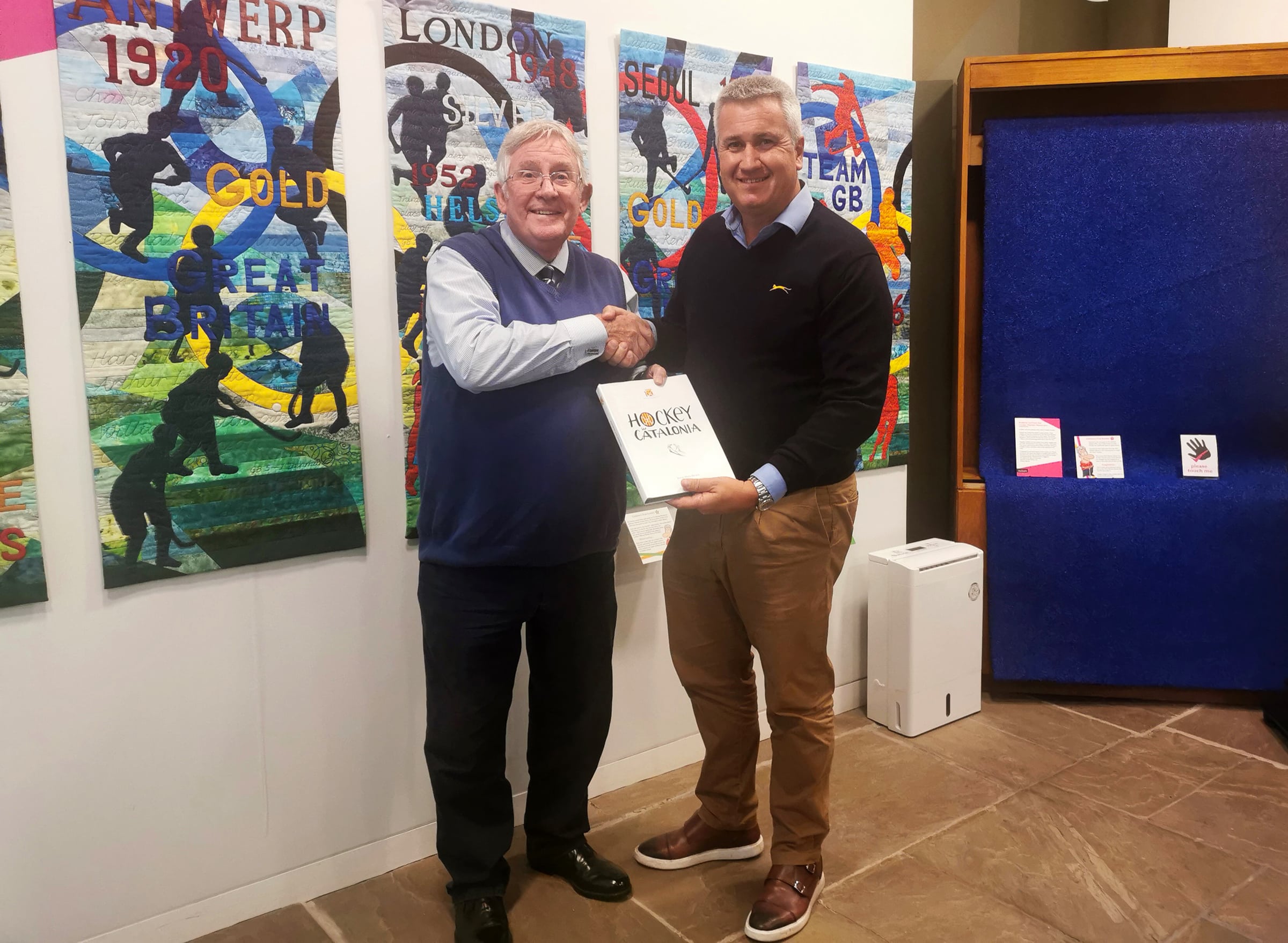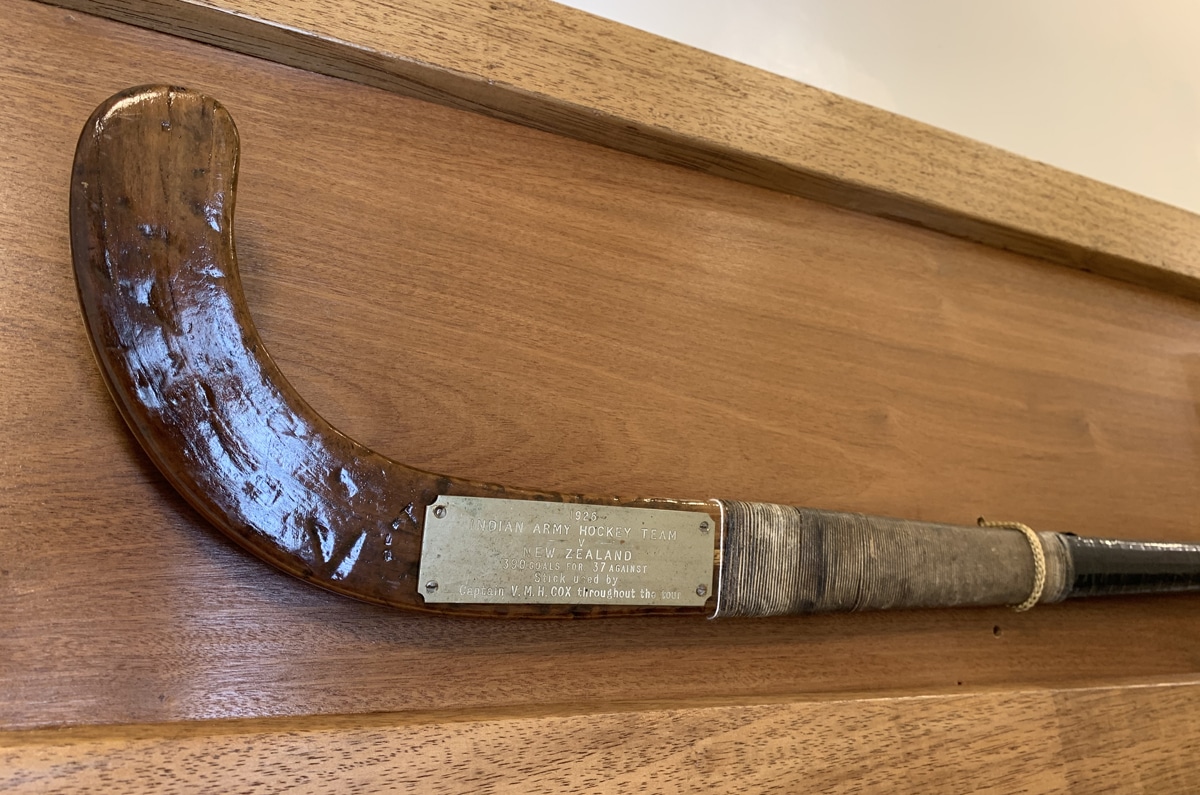Eric Liddell by Eileen Soper. © Chris Beetles Gallery of behalf of the estate of the artist.
The Scottish sprinter Eric Liddell is best remembered for his Olympic achievements, the strength of his Christian faith, and his efforts to better the lives of young people during his time in a Japanese-run internment camp in China during World War Two. Eric was born to Scottish missionaries and spent his early years living in Tientsin, China. He attended boarding school in London where he entered into the world of sport and athletics. He gained a reputation as the fastest man in Scotland after the 1924 Paris Olympic Games, but in the following years he would be affectionately remembered for his mentorship inspired by his Christian beliefs. It is little known that Eric used hockey to raise the morale of fellow prisoners of war during a time of immense hardship. His life was a story of athleticism, heroism, and humanitarianism.
The Paris Olympic Games in 1924
The unusual nature of Eric’s unexpected event change at the 1924 Paris Olympic Games made him a sporting icon. He had originally entered for the 100-metre sprint, an event he excelled in after previously setting a new British record of 9.7 seconds for 100 yards (91.44 metres). He was also due to compete in the 4 x 100 metre relay and the 4 x 400 metre relay. This plan changed when the qualifying heats were announced to be held on a Sunday and being a devout Christian, Sundays were a Sabbath (a day of rest and worship). Famously, Eric switched from participating in the 100 metres to the 400 metres event. Although it was widely believed that he had only discovered the overlap on board the boat to Paris, Eric had been quietly aware of the Olympic schedule for months prior and had been preparing for the 400 metres which fortunately held its heats on a different day. He had always trained as a sprinter so treated the new 400 metres as such. By the first 200 metres he had created good distance between himself and the rest of the field. Despite the risks, Eric took home a gold medal and set a new Olympic and world record of 47.6 seconds which would stay unbeaten for the next 12 years. His religious devotion and strict stance on Sundays had earned him a reputation within the athletics community and initially the British press was eager to criticise his decision. When the media first learned of his event change, they had considered his actions “unpatriotic”; however, after receiving his gold medal in the 400 metres, and a bronze in the 200 metres, they swiftly switched to praise him as a Scottish hero. The uniqueness of his situation would later inspire the film Chariots of Fire.
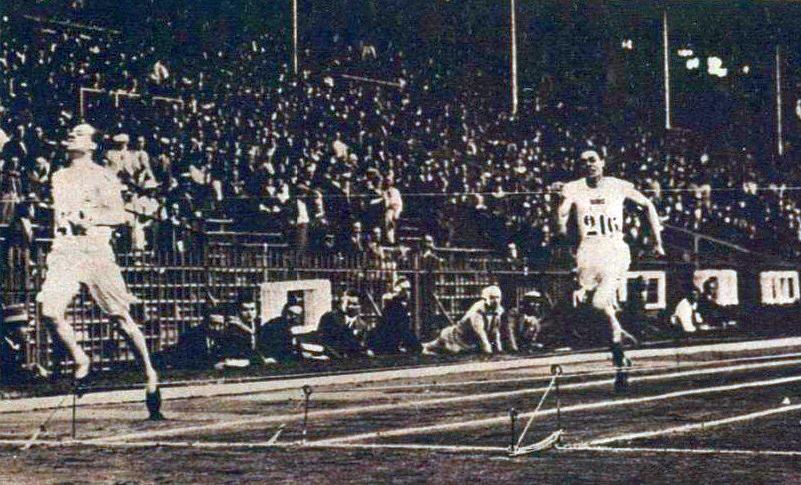
The 400 metres final at the 1924 Paris Olympic Games. Eric Liddell wins ahead of the American Horatio Fitch.
Wikimedia/public domain.
Eric Liddell’s 1924 Olympic victory in Paris took place in the Colombes Olympic Stadium, the same stadium which is being used for the 2024 Paris Olympic hockey tournament. This location also featured in a previous article by The Hockey Museum for hosting the last hockey match before the Second World War in 1939.
The Last Hockey Tournament Before the Second World War | The Hockey Museum
Colombes stadium in 1924 and under construction in February 2024 (via GB Hockey on X/Twitter): https://x.com/GBHockey/status/1760998438886416730?mx=2
Missionary activity, internment and hockey during World War Two
After the Paris Games Eric graduated from the University of Edinburgh and returned to his birthplace in China where he received further success in sprints and athletics competitions between 1928 and 1930. However, his athletics career would be cut surprisingly short when he decided to follow in his parents’ footsteps by pursuing work as a Christian missionary. His missionary work was mainly focused within colleges and schools around China where he worked as a teacher of science and mathematics – experience that would later prove life changing to the children and young adults who were incarcerated in Weihsien Internment Camp with him.
In 1941 countries were already facing the conflict of World War Two and now relations between China and Japan had also grown hostile. Japan had invaded parts of China and missionary stations within the country were vital in providing medical aid and supplies to the locals who found themselves on the new frontlines. Eric’s brother Rob Liddell was a medical worker in Xiaozhang and his station was in desperate need of support after the recent influx of displaced people. Rob was also battling an illness of his own. Upon hearing of his brother’s struggles Eric headed for Xiaozhang to help, only after saying goodbye to his pregnant wife and two children who were leaving for the safety of Canada. This was the last time he would ever see his wife or children; Japanese forces would soon take control over the area and in 1945 Eric was placed in the Weihsien Internment Camp where he would remain for the rest of his life.
The camp’s conditions were dire with around 1,200-1,800 people of various nationalities, ages, and backgrounds all confined to a camp guarded by armed troops and electrified barbed wire. Food and resources were limited so the prisoners made do with few materials and desperately relied on medical supplies sent by the Red Cross and Salvation Army.
Eric’s faith and personal determination were immediately put into action as he set out to ease the struggles that came with confinement for the people around him. He stood in ration queues on behalf of the elderly, organised memorial services for fellow prisoners, and was chief translator and de facto mediator for the camp. As one of the few qualified teachers, Eric sought out materials to help continue the children’s schooling:
“We had very few textbooks, blackboards, chalk or apparatus … Yet we put three sets through a form of School Certificate which Oxford University accepted”.
The camp also contained an athletics ground which was suitable for hockey or softball. Eric was appointed head of sports and eagerly utilised hockey matches to keep adults and children of the camp inspired and motivated. This was no easy task as conditions within the camp kept morale low, but after a lot of persuasion he soon had enough members to form teams and hold matches. Alongside gathering players, Liddell also had to find and maintain the necessary equipment for his hockey matches. Resources were scarce but he would forfeit his own curtains and sheets that his wife had left him and use the material to mend the few hockey sticks remaining in the camp. He used the sheets to bind up their damaged blades and varnished the cloth with glue which he had patiently melted down over a small single candle oil lamp. It was said that over the years of his internment, Liddel’s primary focus was to make life better for the estimated 500 children within the camp.
His determination to better the lives of the young people around him was shown most in his decision to prioritise those young lives over his faith. His attitude towards playing sport on Sundays had not changed since the Olympic Games and he had continued this principle as head of camp recreational activities. Nevertheless, one Sunday a group of restless teenagers, who had undoubtedly been relying on Eric’s hockey matches to stay occupied, attempted to organise a boys versus girls match of their own. Without Eric’s presence as mediator, the match was tense and turned into a “free fight”. After witnessing this, and against all odds, that next Sunday Eric was out on the pitch as umpire.
“He did the right thing in these conditions … The world knows his personal [religious] position from his great testimony at the Olympic Games”.
He would continue to organise events every evening and return each Sunday as umpire for the rest of his internment until 21 February 1945 when he died of a brain tumour.
Eric Liddell was a man who was strongly devoted to his faith, to the extent that he risked losing his reputation and amateur athletics career. When it came to the betterment of others however, especially those young lives affected by war, he used his faith as motivation to ensure the health and happiness of those around him. Eric Liddell was not only a star athlete and Olympian but a hero to the children of Weihsien.
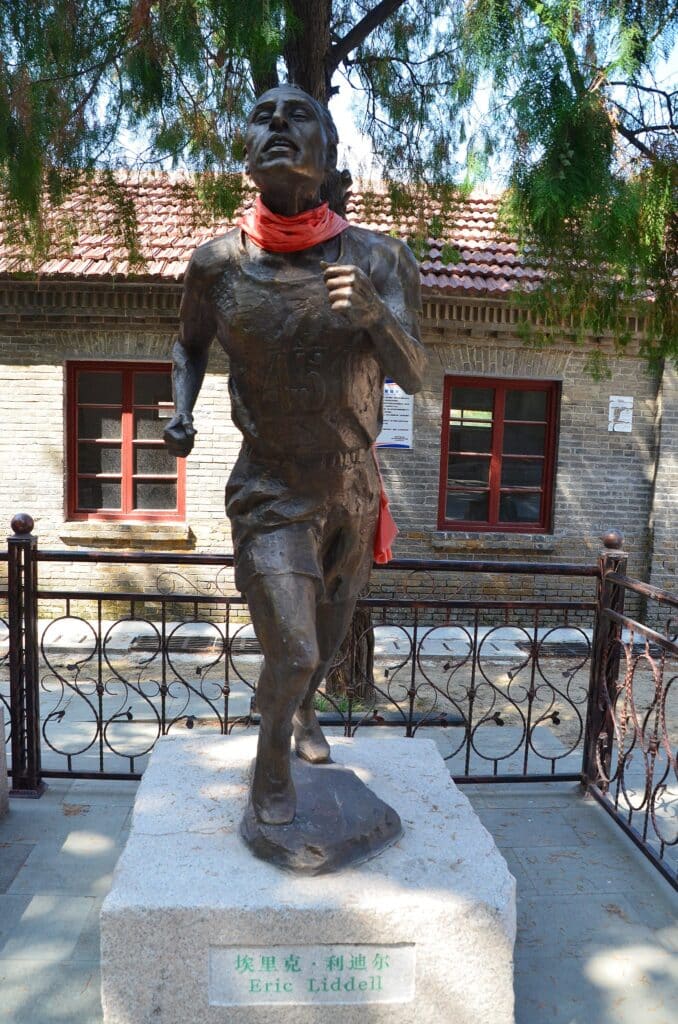
A statue of Eric Liddell stands outside the Weihsien Internment Camp (now a museum) where he died in 1945.
Wikimedia/CC-BY-SA.
The Eric Liddell 100
100 years on from Eric Liddell’s gold medal success at the 1924 Paris Olympic Games his life and legacy are being celebrated. Throughout 2024 The Eric Liddell 100 is delivering a programme of events and activities which recognise and celebrate the life, sporting and community service achievements of Eric Liddell. The mission for this initiative, led by The Eric Liddell Community (a care charity in Edinburgh), is to inspire new generations to make a positive impact on their community, their society and their world.


